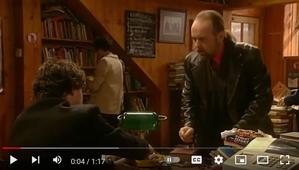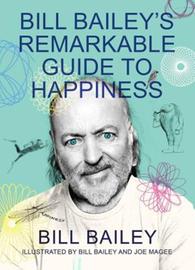Write down your concerns and be surprised at how quickly they dissolve when you read them on paper.
--The Little Book of Calm by Paul Wilson

Things get more complicated for Manny later at his workplace when he accidentally swallows the book. In the hospital, his doctor (Martin Freeman) breaks the news that "somehow you assimilated it into your system overnight." For a brief time, Manny the Calm arises from the hospital bed to dispense wisdom. When his tenuous well-being is literally knocked out of him, he takes the only rational course available by starting a new job as a bookseller... at Black Books.
I thought about Manny when I read this recently: "Consuming traditional forms of media--including books, music and television--has little effect on short-term adult well-being, according to a new study by researchers from the University of Oxford, University of Vienna and Nesta published in Scientific Reports. It is often assumed that engaging with traditional types of media improves well-being, while using newer types of media, such as social media, worsens well-being. However, evidence of traditional media consumption improving well-being has been lacking."
Putting aside (for Manny's sake) the press release's use of the word "consuming," I couldn't help recalling all of those other studies in recent years proclaiming variations on a theme of "reading fiction for fun improves language skills, study reveals" or "reading fiction increases empathy and encourages understanding." What's a book reader to think?
This latest study examined the media consumption habits and well-being levels of 2,159 U.K. adults between April and May 2020, during the pandemic. Weekly surveys were conducted, with participants reporting the time they had spent engaging with music, television, films, video games, books, magazines and audiobooks "and their happiness and anxiety levels during the previous day."
Lead author Dr. Niklas Johannes of the Oxford Internet Institute, University of Oxford, said, "There is a popular misconception that all forms of new media have a negative impact on our mental health but consuming traditional media such as reading books, is good for us. Yet that isn't necessarily the case, as our latest research shows."
The paper contends that "changes in the types of media people consumed and the amount of time people spent engaging with traditional media were not associated with substantial changes in anxiety or happiness levels. Together, the findings suggest that the overall impact of consuming traditional media on short-term well-being are negligible."
Dr. Johannes added: "There is a dominant narrative that all forms of new media are bad for you and using traditional forms of media is good for your mental health. But our findings show that the overall impact of traditional media on short-term well-being is minimal. It's really important that we try to shift the debate away from such an elitist view and look at other factors that influence peoples' general well-being."
I have suspicions about the concept of "short-term well-being" when applied to reading books. Happiness? Anxiety? Those aren't words I'd burden my reading expectations with either. The last six books I read were Louise Erdrich's The Sentence; Damon Galgut's The Promise; Sandrine Colette's The Forests; Amanda Lohrey's The Labyrinth; Joy Williams's Harrow and Muriel Barbery's A Single Rose, all of which, I believe, were good for my long-term well-being. If they sparked anxiety sometimes, they meant to. And happiness came from encountering great reads. It's complicated.
 I don't mean for this to be a new media bad/traditional media good take, but I keep thinking about the strangeness of that word happy in the latest study. Which leads me, of course, to a book: Bill Bailey's Remarkable Guide to Happiness. In his chapter on reading, Bailey observes: "For the avoidance of doubt, I am writing about reading, as in 'interpreting the written word with your eyes or, if blind, fingers,' not Reading, the town in Berkshire. Which is not to say that Reading has not been a source of happiness. Indeed, I have spent many happy times there....
I don't mean for this to be a new media bad/traditional media good take, but I keep thinking about the strangeness of that word happy in the latest study. Which leads me, of course, to a book: Bill Bailey's Remarkable Guide to Happiness. In his chapter on reading, Bailey observes: "For the avoidance of doubt, I am writing about reading, as in 'interpreting the written word with your eyes or, if blind, fingers,' not Reading, the town in Berkshire. Which is not to say that Reading has not been a source of happiness. Indeed, I have spent many happy times there....
"There are days when we have the time and the need to lose ourselves in a book. I consume books and the written word like homemade brownies; I revel in being gripped by the twists and turns of a thriller, being immersed in a classic or a biography, fascinated by a feature, a column, even the instructions that accompany a vegetable steamer.
"There are many scholarly articles which list the benefits of reading, ranging from having a greater vocabulary to being more thoughtful towards others, or even broadening your outlook on life generally. Novels in particular can allow you to visualize and imagine scenarios you might find yourself in, so that you rehearse how you might react to those situations in real life."
On the other hand, it was through newish media (specifically Facebook and YouTube) that I learned, in December 2020, that Bailey had become the unlikely winner of the British TV competition program Strictly Come Dancing. That was indeed a moment of profound happiness with no anxiety attached, and definitely improved my short-term well-being.

